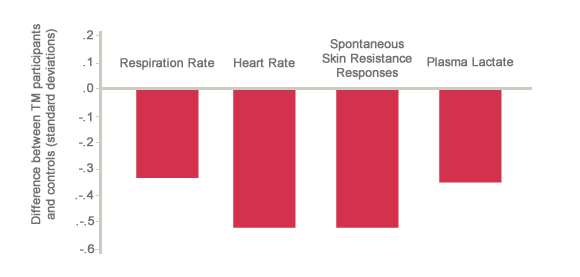TM Works for Social Workers

The good we secure for ourselves is precarious and uncertain until it is secured for all of us and incorporated into our common life. – Jane Addams, founder of the social work profession in the USA, recipient of the Nobel Peace Prize, activist, reformer, author, and social worker.
Those who choose social work as a career are individuals with a passion for helping others secure good lives. But often this career comes with a hefty price tag. Some say that even the training to become a social worker is difficult, complicated, and taxing. Once established in the profession, most social workers find they have an impossibly burdensome caseload, are confronted with ineffectual routine tasks, are rarely offered opportunities for advancement, and have minimal resources and support. The stress associated with these factors can rise to such a degree that one becomes debilitated—this condition is called burnout, and it can compromise our work, family, health and well-being.
The National Association of Social Workers Membership Workforce Study on coping with Stress at Work states:
Considering their experiences of insufficient time to complete day-to-day work tasks, heavy workloads, poor compensation, challenging and/or difficult clients, few resources, long work hours, and unclear job expectations, it is not surprising that social workers experience work-related stress. Under these less-than-optimal work conditions, social workers are often “pushed to the limit” when trying to complete their job requirements. Over time, work-related stress can result in burnout, increased risk for work place injury, impaired performance, poor mental health, impaired cognitive functioning, decreased concentration, and health-related problems for social workers. Additionally, these issues may cause these professionals to consider a career change. Reestablishing a sense of control, mastery, and competence in one’s work situation may seem, at first glance, a daunting task. However, with strategies like regular exercise, meditation/relaxation techniques, and therapy—identified by professional social workers as useful coping tools—alleviating work stress can be an attainable goal.
Cortisol is a stress hormone best known for its involvement in the fight or flight response. Science indicates that, under stress, women produce more of it than men. (The great majority of social workers are women.) Once the production of cortisol begins, recovery is slower in women. Research shows that women’s stress levels at work remain elevated and more likely to spill over into non-work situations. When a woman feels physically, emotionally or mentally threatened, her body might create a complex cascade of stress hormones. When stress hormones are elevated long-term, the condition is known as chronic stress—which wreaks havoc, often in the form of greater insulin resistance, or weight gain, or hypertension, or full blown heart disease.
Traumatic Stress
A social worker named Rachel in New York City, assigned to casework with children among some of Brooklyn’s poorest, most challenged families, was taunted in their neighborhood by aggressive young men who assumed her role was to remove children from their parents. She left for work feeling despondent and frightened each morning and arrived home in tears each night. She developed insomnia and depression, increasingly suspected she would never improve anyone’s circumstances due to systemic resource problems in the city, and quit. Rachel was not unique in her experience professionally or personally.
A study published by the Institute of Education Sciences called Prevalence of Secondary Traumatic Stress among Social Workers reported that social workers see increased demand for services from people who have been exposed to traumatic events including domestic violence, violent crime, terrorism and natural disasters. As a direct result of providing their services to this traumatized population, social workers can develop secondary traumatic stress (STS) and even PTSD.
The ACS-NYU Children’s Trauma Institute seeks to promote resilience and reduce secondary trauma among child welfare staff. Their participant handbook’s introduction notes that child welfare staff are first responders like fire-fighters and police officers. Social workers are often physically at-risk when they must respond to emergency situations with little information and there are significant psychological risks involved when providing services and care to abused, traumatized, or neglected families. Child welfare staff are particularly vulnerable to STS because of the vulnerable nature of their clients, the unpredictable nature of their jobs, and their relative lack of physical and psychological protection.
Exhaustion, compassion fatigue, nightmares, insomnia, PTSD, STS, anxiety and stress begin to characterize the lives of some of our nation’s most needed and passionate caring individuals. But help is at hand….
The TM program: A Health and Career-Saver for Social Workers
More than six million people have learned the Transcendental Meditation technique; it is easy to learn and simple to do. While sitting comfortably with closed eyes, the meditator experiences a profound state of relaxation in both the mind and the body—a state of settled restful alertness. The psychophysiological changes that take place during this unique experience give rise to a broad range of benefits mentally, physically, behaviorally, and spiritually.
Francisca Nubia Koser, MSW, is a licensed registered clinical social worker intern in Florida. She wrote:
TM made me a better social worker. I’ve found that TM prevents occupational burnout, enables higher work performance, increases focus, memory and intelligence, and improves information processing. Transcendental Meditation is also a reliable and effective technique to recommend to clients and patients who need help with their depression, addiction, relationships, hyperactivity, health, self-esteem, moods and emotional intelligence.
More than 380 published peer-reviewed studies on the Transcendental Meditation program have shown wonderful benefits for women, including reduction of stress, increased resistance to stress, and faster recovery from stress.
Norman Rosenthal, M.D., of Georgetown Medical School was previously a senior researcher at the National Institute of Mental Health. He studied the data and interviewed many people who learned the technique and declared, “No other ‘stress management technique’ has anywhere close to this amount of hard data in support of its claims to reduce stress.”
In a study of thirty post-menopausal women who were subjected to a metabolic stressor, sixteen were long time practitioners of the TM technique and fourteen were non-meditating controls. Before being subjected to a metabolic stressor, the cortisol was the same for the women in both groups. After the stressor, cortisol rose faster in the controls; later on, indications were that cortisol was three times higher. This study shows that the practitioners of the TM program were more resistant to factors that cause stress. (Read study in Annals of the New York Academy of Sciences)
In other research that compared individuals practicing the TM technique to a individuals given health education, the baseline day-to-day level of cortisol after four months was a third lower in the TM group than in the health education group, indicating that the stress-reducing results of the TM practice are superior to health education alone.

Calmer Style of Physiological Functioning, Less Stress in Daily Activity Through the TM technique. Reference: American Psychologist 42: 879–881, 1987.
“Having done social work for more than 12 years with families, abused children and in schools, I can say with assurance that TM has literally saved my life on those chaotic mornings when clients were upset or couldn’t focus. Often they were incapacitated, lacking information, and their goals were unclear to them. So often, having meditated at home in the morning, I found that my calm, careful manner settled them right away and we were able to work collaboratively. Adult clients in the most stressful situations—such as those with PTSD, sleep deprivation, or high parenting stress—who took the TM course were then better able to find ways to improve their lives.”
Mary Doan, retired social worker, California
As well as, and partially because of, reducing stress, the TM technique has been shown by a large body of research to improve focus, reduce insomnia, decrease depression, increase resilience, and improve tolerance—all necessary traits for a social worker.
And here’s a bonus for certified social workers who are interested in learning the TM technique: the course Transcendental Meditation® (TM®) for Licensed Social Workers: Preventing Professional Burnout is approved by the National Association of Social Workers (Approval # 886735603-0) for 13 Social Work continuing education contact hours.
About the Author
Janet Hoffman is the executive director of TM for Women Professionals, a division of TM for Women in the USA
More Posts by Janet
- A Simple Guide to Healthy Happy Mothers and Babies: An Interview with Author Margaret Mullins
- Author Ann Purcell Discusses Silence
- Five Fundamentals of Progress: A Scientific Path to Self-Improvement
- Advice You Can Rely On: How to Leverage Your Body’s Innate Healing Ability
- Saving the Ocean from Deadly Noise Pollution: An Interview with Kathy Matara PhD





